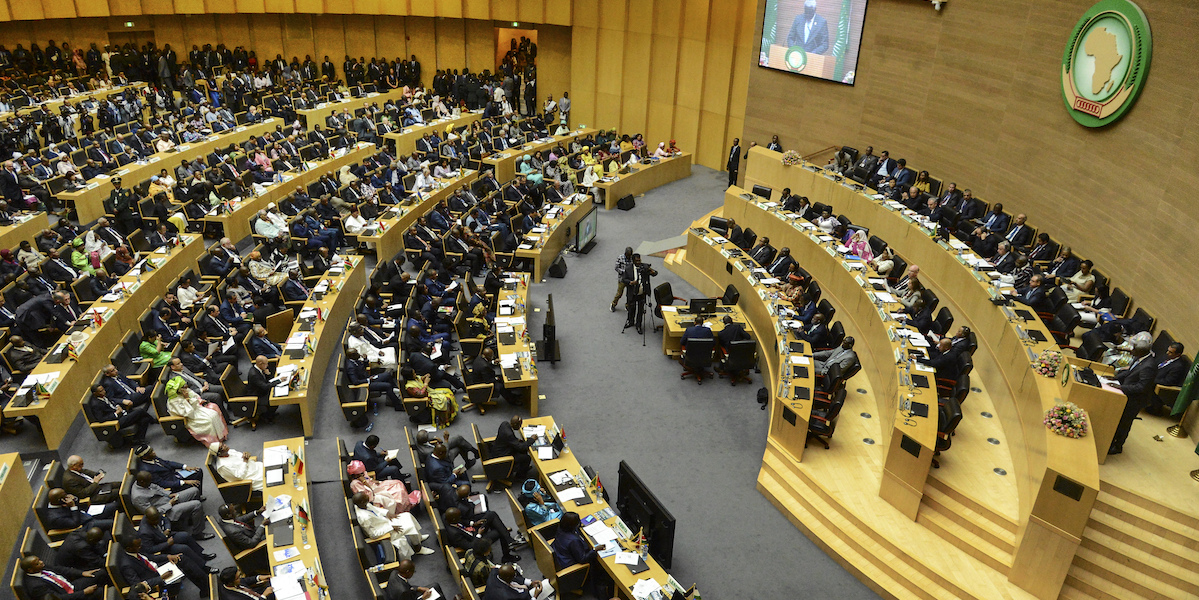Sixty years ago, on May 25, 1963, 32 African states signed in Addis Ababa, Ethiopia, the treaty establishing theOrganization of African Unity, which for almost forty years has promoted the idea of a more united and decolonized Africa. Since 2002 the organization has been transformed into the African Union, the name by which it is still known today. It is made up of 55 member states, has common political, economic and military bodies as well as ambitious objectives, which have been achieved only in part and have been hindered above all by the desire of the individual countries to maintain complete autonomy on some matters (as happened with degrees different in all regional organizations, such as the European Union).
L’Organization of African Unity was born on the push of a fort panafricanismoa movement which in those years was popular in the African-American community in the United States and which wanted to encourage and strengthen the bonds of solidarity between all the ethnic groups involved in the African diaspora and between all the countries of the continent.
Today the model of the African Union is the European Union: the creation of a single market is one of the objectives that it is trying to achieve.
In sixty years, the African Union has achieved important results, but has proved ineffective in preventing, or at least sanctioning, coups and civil wars on the continent. The hoped-for greater unity of the continent has often collided with substantial differences in terms of development of various macro-regions, with even growing tensions, for example between the countries of the Maghreb (Algeria, Morocco, Tunisia, among others) and the sub-Saharan ones.
African leaders after the creation of the Organization of African Unity on May 25, 1963: Ethiopian Emperor Haile Selassie in the center (AP Photo)
In the years preceding the meeting which led to the foundation of theOrganization of African unity there were different visions on the models on which to structure the nascent body.
The Ghanaian president Kwame Nkrumah, one of the inspirers, hoped for a structure similar to the US one, with a federal state, military forces, diplomatic representations and common economic market. However, the ambitious project was set aside by a majority of heads of state and government who, on the other hand, did not intend to give up important parts of their sovereignty. The Organization was based on the model of theOrganization of American States or of the Arab League: it would not have interfered in the internal affairs of the member states.
One of the first objectives was decolonization, therefore the process that was to lead to independence those states that were then colonies of European countries. The Organization provided diplomatic and logistical support to national liberation movements across the continent and 50 countries gained independence by 1977. Various bodies were also created which had to somehow foster forms of integration between African countries in the most disparate fields (from the Pan-African Union of Writers to that of archaeologists, from the association for the control of mosquitoes to that of farmers). Free trade markets for goods were also created that included multiple states in the same area of the continent: the Organization later recognized eight of them.
The passage to the African Union took place in 2002, above all by the will of the Libyan leader Muammar Gaddafi: the new organization provided for a parliament, a government commission, stable economic and judicial structures, as well as a rotating presidency for the various leaders of African countries .
In recent decades, and thanks to numerous attempts at greater integration, the African Union has become a diplomatic presence, with accredited ambassadors from 50 countries around the world and representative offices in Brussels, Beijing, Cairo, New York and Washington. However, many limits continued to exist and the idea of creating a sort of “common foreign policy” remained only on paper.

Muammar Gaddafi at a 1983 African Union meeting (AP Photo/Saris)
The Union has a Peace and Security Council which has met twice a month for almost twenty years. Its peacekeeping forces have intervened in dozens of local crises, both to try to guarantee peace and to fight against terrorism, often in collaboration with the UN. The African Union is also very active in the health field, with the funding and organization of campaigns against malaria, AIDS or COVID.
However, the Organization has almost always proved to be ineffective and without powers in preventing or sanctioning the military coups that have characterized the history of the last 60 years of the continent: there have been more than 200 since most African nations obtained the ‘independence. In many cases, the Union limited itself to suspending member countries from the organization in which the elected governments had been overthrown by coups (Mali, Guinea, Sudan and Burkina Faso are currently suspended). One of the organization’s programs aimed to “silencing the guns” by 2020: civil wars and active terrorist groups mean that the goal has been largely missed.
Another unresolved issue concerns the surveillance and guarantee of electoral processes in the various member countries: the delegations of observers have often recorded violations for which effective sanctions are not envisaged.
Even at an economic level, the creation of a single market is proceeding slowly: the 1991 Abuja treaty envisaged a 34-year journey to achieve free trade throughout the continent. The Free Trade Area has been approved by the majority of states but ratified by a limited number: making it effective is one of the goals of theAgenda 2063, when a hundred years will have passed since the first creation of a continental organization. The Union is also having problems getting at the moment due payments from member states to finance their activities.
Even greater restrictions concern the freedom of movement of people within the continent. In 2018, a Protocol on free movement within the African Union was approved, which provides for freedom of movement and residence within the countries of the Union on paper. In reality, four years later it was ratified by only four nations: Mali, Rwanda, Niger and São Tomé and Príncipe. The growing xenophobic tensions registered in Tunisia, for example, seem to go in the opposite direction to the desired one.


